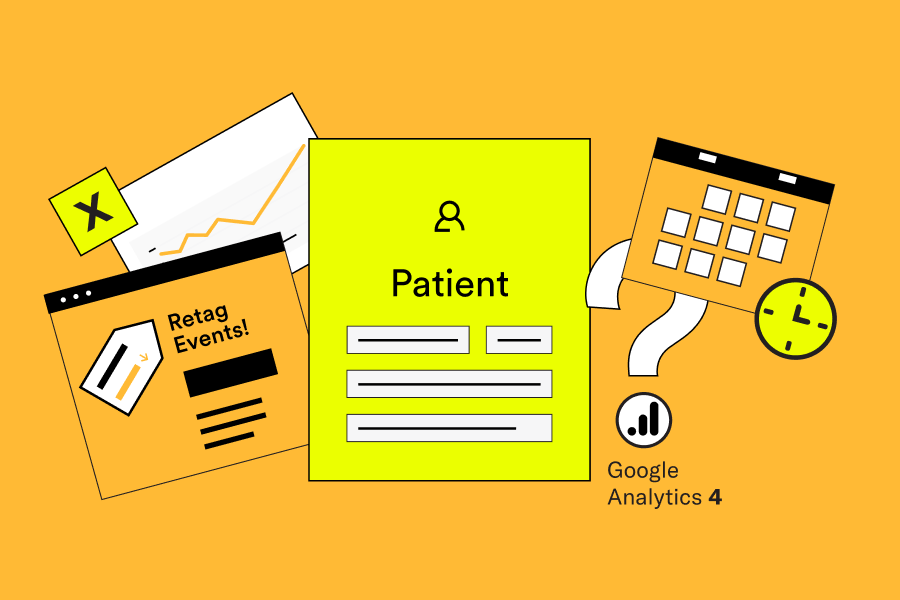In today’s world, healthcare organizations rely on digital channels more than ever before. From delivering care to regular communications, patient engagements increasingly occur online. That’s why it’s crucial that healthcare communications and marketing executives have a clear picture of how patients and consumers interact with their organization’s website or online product.
Often, those interactions are assessed using Google Analytics. Google Analytics 4 (GA4) is the latest version of the platform—but it is limited in ways that may make it more of an ailment than a cure for healthcare teams.
The wrong prescription to treat compliance
One issue is security and compliance. To remain compliant with relevant laws and regulations, an analytics solution needs to protect patient data. GA4 lacks the necessary safeguards to meet healthcare’s security and privacy needs.
To start, GA4 relies heavily on manual tagging, which opens up many opportunities for human error. Without proper configuration and tracking, the wrong data might be captured. If that data contains personally identifiable information, it’s a major issue for compliance.
On top of that, GA4 does not provide granular control over data access or retention policies. Without the right access controls and permissions, unauthorized individuals could access sensitive information. Considering the exposure risk, this becomes an even bigger threat.
To mitigate security concerns, healthcare teams need a more advanced platform than GA4. The right solution needs to have robust security configurations, with features like data encryption and auditing to further reduce the risk of data breaches. Beyond that, a solution with automated data capture ensures data is processed with the right protections in place. This allows teams to focus more on insights, and less on their tool’s ability to support compliance needs.
Compliance is not a one-time checkmark. It is an ongoing process that requires constant monitoring. Healthcare teams must consider all potential risks when selecting an analytics solution.
Limitations create unreliable diagnostics
While GA4 does bring some needed improvements to Google Analytics, it’s still centered on BI-driven web traffic analysis. While it offers some high-level insights out of the box, these are often bare-bones reports. To go beyond basic web traffic analysis, data will need to be sent downstream, where an SQL expert can build custom reports in a platform like BigQuery.
The issue is, healthcare organizations often have limited resources for data analysis. If GA4 had visual labeling or event exploration, it would be easier to jump into queries. Without self-serve analytics, GA4 can increase costs and delays. A better solution allows anyone to get insights, regardless of technical expertise.
As mentioned above, GA4 is also a standard manual tagging platform. Therefore, relying on engineering teams to change and manage any events or user attributes is necessary. These requirements make behavioral tracking time-consuming, slow, messy, and incomplete. It also makes data unreliable.
Alternatives with a better prognosis
Given GA4’s limitations, healthcare organizations should consider options better suited to their needs. Find an analytics solution that meets more than the bare minimum. Features to look for include:
● Enhanced data security through customizable configurations, data encryption, and compliance protections
● Automated event tracking that mitigates the issues of manual tagging
● An event visualizer that makes it easy to explore your data and understand trends
● Customizable dashboards and reports that don’t need SQL experts
● Integrations with popular healthcare marketing and CRM platforms like HubSpot, Salesforce, and Marketo
● Powerful data science that surfaces overlooked insights and optimization opportunities
With the right digital insights platform, healthcare teams get speed to insight with peace of mind. Bottom line…teams need to be agile and responsive to changing patient needs. From limited security controls to unsophisticated insights, GA4 creates more barriers than solutions.
Learn More:
Data-Driven Healthcare. Discover the most significant issues GA4 poses for healthcare teams. Watch Now
Atria Senior Living: Marketing Strategies with Modern Data Analytics. Learn how Atria successfully shifted from basic web and event tracking in GA4 to complete, behavioral insights. Watch Now
Complete Digital Insights for Healthcare. Get a full breakdown of how healthcare digital teams use fast, actionable insights to power better digital patient experiences. View Guide

Mona Popli is the Vice President of Product Marketing at Heap, the leading provider of digital insights. An accomplished product strategy and management professional, she has over 18 years of experience leading teams and bringing products to market across SaaS, Financial Technology, and Capital Markets.


